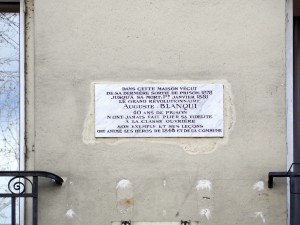
Boulevard Blanqui named Louis-Auguste Blanqui, one of French history’s most radical leftists, known for his conspiratorial strategies and whom even Marx and Lenin thought too extreme. He sought to implement socialism by mobilising secret armed groups to seize power and crush the bourgeoisie and spent a total of 33 years behind bars.
Whilst a song fondly recalling Margaret Thatcher – ‘Ding Dong The Witch is Dead’ – soars up the British pop charts, an attempt by a right-wing Paris councilor to name a street after Thatcher has been denounced by a left-wing politician who says it would be more appropriate to name a street after Bobby Sands.
City Councillor Jerome Dubus of the right-wing UMP party has said that at the next council meeting he will propose naming a street or a square after Thatcher, the former war criminal, who Following the announcement of Thatcher‘s death on Monday, UMP councillor Jerome Dubus said he would submit a proposal for a street or square to be named after Thatcher, as a “a small gesture for a great lady”.
But Councillor Ian Brossat, of the Communist-backed Left Front, denounced the move and said the city would do better to honour Bobby Sands.
“Lacking any personality and a leader, the UMP is looking for its good fairy in the past, and across the Channel… The cynicism of the Parisian right knows no bounds,” Brossat said. “Jerome Dubus’s proposal is a joke…. Thatcher was the apostle of British ultra-liberalism, who left an appalling legacy for the state and the working classes.”
“It would be better to name a street after Bobby Sands whom Thatcher allowed to die of hunger with other prisoners.”
Several French cities already have a Rue Bobby Sands. Paris has made a habit of immortalising eminent figures from history through its street signs including philosophers, scientists, writers, artists and revolutionaries.
Meantime, the song ‘Ding Dong The Witch Is Dead’ (from ‘The Wizard of Oz’) was re-released in the wake of Thatcher’s death and is soaring up the British charts. It is expected to be in a top slot when the Official Chart Show airs on the BBC on Sunday. Calls for it to be banned on the grounds of taste and decency have been rejected by BBC executives,
This represents progress of a sort: in 1972 just after Bloody Sunday the BBC banned Paul McCartney’s song ‘Give Ireland Back to the Irish’ and thereafter banned many songs about British injustice including one by the Pogues, ‘Streets of Sorrow’, about the wrongful conviction of the Birmingham Six and Guildford Four.




